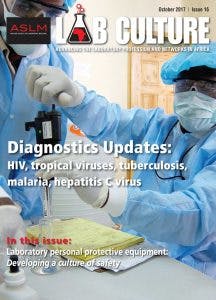Recently, the African Society for Laboratory Medicine (ASLM) reached out to Medical Laboratory Observer (MLO) to assist the organization in its efforts to educate laboratorians in Africa with its publication, Lab Culture. As the need increases for laboratorians to understand global diseases, laboratory tests, environmental test constraints, and safety, MLO is working to help ASLM move toward its stated goals:
- To mobilize efforts to strengthen the laboratory workforce to meet Africa’s growing healthcare needs;
- To transform laboratory testing quality through quality improvement and accreditation programs;
- To support the development of strong, harmonized regulatory systems for diagnostic products; and
- To build networks of national public health laboratories to improve early disease detection and collaborative research.
To that end, ASLM has partnered with MLO to help deliver Lab Culture’s quality content. It will be available to anyone with an internet connection all over the world.
ASLM history
The African Society for Laboratory Medicine (ASLM) is a pan‐African professional body working to advocate for the critical role and needs of laboratory medicine and networks throughout Africa. Founded in 2011, ASLM is headquartered in Addis Ababa, Ethiopia.
ASLM announced the appointment of its new Chief Executive Officer (CEO), Dr. Ali Elbireer, on November 1, 2016. Dr. Elbireer was a faculty member of the Johns Hopkins University (JHU) School of Medicine, Baltimore, MD. He is a native of Sudan and has been the Country Director for JHU-NGO in Uganda for the past decade. He holds a Master of Business Administration (MBA) degree from Pfeiffer University, NC, and a doctoral degree (PhD) in Healthcare Administration from North Central University, AZ. He brings a strong history of leadership, having held positions in several healthcare establishments, including medical laboratories, research facilities, centers of excellence, and hospitals in the United States and Africa.
Furthermore, Dr. Elbireer was the Laboratory Administrative Director for Makerere University-JHU at the Infectious Diseases Institute (MU-JHU/IDI) in Kampala, Uganda. The MU-JHU/IDI Core Laboratory became the second College of American Pathologists (CAP)-accredited medical laboratory in Africa in 2003.
Under Dr. Elbireer’s leadership, the MU-JHU/IDI Core Laboratory was selected in 2008 and 2010 by MLO as a Laboratory of the Year (second and first runner-up, respectively). This was the first international laboratory to be selected for this honor.
Growing professional knowledge
As we know, laboratory services, networks, and systems are indispensable to effective healthcare. Medical laboratories play a pivotal role in global disease diagnosis, surveillance, outbreak investigation, and initiation and monitoring of therapy, as well as research and development.
Unfortunately, medical laboratories in many African countries are underdeveloped and cannot meet the testing demands of rapidly growing health delivery services in the 21st century. Inadequate resources and diagnostic services compromise the quality of patient care and can contribute to misdiagnosis and consequent under/over treatment of disease, which presents significant economic and public health challenges.
ASLM’s goal of helping laboratory facilities develop strategies for testing infectious diseases such as HIV, tuberculosis (TB), malaria, and emerging diseases depends on the efficient application of diagnostic and monitoring methods performed to a reproducible standard.
In an effort to serve all African countries, ALSM offers Lab Culture as a “member magazine” for laboratorians in Africa—especially those in resource-limited settings—published six times a year. Lab Culture is dedicated to bringing practical, thought-provoking information and inspiration to laboratory professionals across the continent. It covers best practices in laboratory management, prevention and treatment of infectious and non-communicable diseases, promotion of laboratory accreditation, global health security, and more.
Relaunch of Lab Culture
The first issue is focused on current diagnostic needs in Africa beyond HIV, including hepatitis C, emerging infectious diseases, and hemorrhagic fevers. Guidlelines for implementing an effective personal protective equipment (PPE) program and building a culture of safety in the laboratory are also featured.
Future issues will explore how Africa will meet the growing global threat of antimicrobial resistance and how to bring quality management systems to the next level with Stepwise Laboratory Quality Improvement Process Towards Accreditation (SLIPTA) and Strengthening Laboratory Management Toward Accreditation (SLMTA) programs.
ASLM’s international reputation, existing partnerships, collective expertise, and convening power all speak to its ability to bring diverse political, economic, and healthcare stakeholders together with laboratory leaders and ensure that their voices are heard. The strength of Africa’s laboratory workforce and its leadership are the foundation of that vision.
Your help is welcome
MLO welcomes your outreach stories, education pathways, and product information that may be helpful to developing an efficient and effective laboratory system. ASLM’s goal is to extend its reach and develop what its leaders believe may be close to 100,000 laboratory professionals in Africa.
For more information about the African Society for Laboratory Medicine, please visit: www.ASLM.org.
For ASLM marketing information, please contact:
[email protected] or [email protected].






